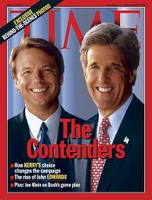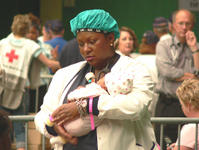 Carolina emphasized the deeply rooted economic, racial, and cultural divisions that are rapidly reshaping the United States as not one, but rather “two Americas”:
Carolina emphasized the deeply rooted economic, racial, and cultural divisions that are rapidly reshaping the United States as not one, but rather “two Americas”:Today, under George W. Bush, there are two Americas, not one: One America that does the work, another that reaps the reward. One America that pays the taxes, another America that gets the tax breaks. One America--middle-class America--whose needs Washington has long forgotten, another America--narrow-interest America--whose every wish is Washington’s command. One America that is struggling to get by, another America that can buy anything it wants, even a Congress and a president.Right-wingers promptly pounced on such statements, denouncing them as calls for a national meritocracy and class warfare (the haves vs. the have-nots), and casting suspicion upon Edwards’ populist intent by likening his analysis to something Karl Marx and Friedrich Engels wrote in their 1848 Communist Manifesto, that “Society as a whole is more and more splitting up into two great hostile camps, into two great classes directly facing each other--bourgeoisie and proletariat.”
But what’s happened in New Orleans since Hurricane Katrina struck there this week--epidemic homelessness, looting, hunger, overflowing bathrooms, people being bused between athletic domes because they have no other place to go, a generally broken infrastructure--has obliged us to “see now with our own eyes the ‘two Americas’ of which John Edwards began speaking a year and a half ago,” as Boston Globe editorial columnist Tom Oliphant put it last night on PBS’s NewsHour with Jim Lehrer. On the one hand, we observe an America that’s white and successful, with options in the face of a crisis; on the other, we find an America that’s poor, in this case mostly African American (since more than 67 percent of New Orleanians are black), and without the means, money, or transportation to flee, no matter the consequences.
 “Many of these Americans who now are struggling to survive are Americans of color,” says U.S. Representative Elijah Cummings (D-Maryland), former chair of the Congressional Black Caucus. “We cannot allow it to be said by history that the difference between those who lived and those who died in the great storm and flood of 2005 was nothing more than poverty, age, or skin color.” Newsday only adds to this controversy in an interview with political scientist Ron Walters, from the University of Maryland, who, the paper maintains, has “little doubt that race and class are factors [in the federal government’s dilatory reaction to the Gulf Coast disaster]. He pointed to the response to recent hurricanes in Florida ‘where the population was predominantly white, where FEMA got cracking in a hurry.’” Walters adds: “Somebody has to fill in the blanks as to why the response was different. We have a traditional response--that a black life is not as valued as a white life.” The same opinion is apparently held by Kanye West, who, during an “Concert for Hurricane Relief,” televised Friday night, declared that the U.S. government is set up “to help the poor, the black people, the less well-off as slow as possible,” and that “George Bush doesn’t care about black people.”
“Many of these Americans who now are struggling to survive are Americans of color,” says U.S. Representative Elijah Cummings (D-Maryland), former chair of the Congressional Black Caucus. “We cannot allow it to be said by history that the difference between those who lived and those who died in the great storm and flood of 2005 was nothing more than poverty, age, or skin color.” Newsday only adds to this controversy in an interview with political scientist Ron Walters, from the University of Maryland, who, the paper maintains, has “little doubt that race and class are factors [in the federal government’s dilatory reaction to the Gulf Coast disaster]. He pointed to the response to recent hurricanes in Florida ‘where the population was predominantly white, where FEMA got cracking in a hurry.’” Walters adds: “Somebody has to fill in the blanks as to why the response was different. We have a traditional response--that a black life is not as valued as a white life.” The same opinion is apparently held by Kanye West, who, during an “Concert for Hurricane Relief,” televised Friday night, declared that the U.S. government is set up “to help the poor, the black people, the less well-off as slow as possible,” and that “George Bush doesn’t care about black people.”Yet African-American author, syndicated columnist, and political analyst Earl Ofari Hutchinson argues in The Huffington Post that “to openly or subtly ... paint the tragedy of New Orleans as yet another terrible example of the black-white divide in America does a horrible disservice to the poor and needy” who are suffering through this tragedy:
Admittedly a majority of them are black, but many of the victims are white too. This stirs fear, anger, and latent racism in many whites. It stirs the same fear anger, and racial antipathies among many blacks.And that’s something John Edwards, for one, does not want to see happen. In a post at the TPM Café site, the once and future Oval Office aspirant writes that priority must be given to rescue and relief efforts along the Gulf Coast. “[B]ut after that we need to think about the American community ...,” Edwards says. “We need people to feel more than sympathy with the victims, we need them to feel empathy with our national community that includes the poor. We have missed opportunities to make certain that all Americans would be more than huddled masses. We have been too slow to act in the face in the misery of our brothers and sisters. This is an ugly and horrifying wake-up call to America. Let us pray we answer this call. Now is the time to act.”
The comments on some black Web sites pulse with wild speculation that the continual TV shots of blacks running wild in the streets are orchestrated to ensure that as little as possible will be done to aid New Orleans blacks. That kind of talk smacks of defeatism. If one screams racism and deliberate neglect, and when it happens scream even louder, I told you so, it becomes a grim self-fulfilling prophecy.
The poor of New Orleans need massive aid, long-term relief, and the continued goodwill and sympathy of the nation to put their lives back together. They also need a sustained public effort to lobby the Bush administration to drastically up the ante on the paltry and embarrassingly low $10 billion that he’s pledged for Katrina disaster relief. That’s less than it costs to bankroll two months of the Iraq war. Sadly, turning the monumental tragedy in New Orleans into racial one-upmanship, piles one tragedy on top of another.
MORE BAD NEWS: The Associated Press is reporting that “there is a very real possibility that another major hurricane may hit New Orleans or some other portion of the 200-mile coastline devastated by Katrina in the weeks to come.” Colorado State University meteorologists are predicting “six more hurricanes” by the time this hurricane season is spent at the end of November, “three of them Category 3 or above. On average, about one major hurricane in three makes landfall in the United States.”
ADDENDUM: It’s the height of coincidence (and a nightmare for the Bush administration) that Katrina should have shined a light on American poverty, just after the U.S. Census Bureau reported that the nation’s poverty rate increased last year for the fourth straight year in a row. The Los Angeles Times explains that “Nearly 37 million Americans, or 12.7 percent lived below the official poverty line in 2004 ... That was a rise of 1.1 million people from 2003, when the poverty rate was 12.5 percent. The poverty rate was last this high in 1998.”
READ MORE: “Editorial: Federal Response Not Acceptable” (New Orleans Times-Picayune); “Flushing Out the Ugly Truth,” by Joan Walsh (Salon); “When a Preventable Tragedy Occurs, Whose Fault Is It? The Victims (Of Course),” by Jesse Kornbluth (The Huffington Post); “Across U.S., Outrage at Response,” by Elisabeth Bumiller (The New York Times); “Katrina According to FOX,” by Farhad Manjoo (Salon); “Domestic Affairs,” by Stirling Newberry (TruthOut); “Katrina’s Assault on Washington” (The New York Times); “Katrina’s Other Ugly Side: Race and Class Divide,” by Melanie McFarland (Seattle Post-Intelligencer); “Why New Orleans Is Sunk,” by Katharine Mieszkowski (Salon).







1 comment:
Man, what would it be like if Edwards was in charge. Can anyone imagine Bush writing and then speaking the words John Edwards has written today? Edwards reaches beyond party lines to tell Americans what is wrong with our social fabric, and how we need to right it NOW.
It bears mention, that the Senator has been speaking about the divisions in America even before most Americans got to see the "other America" in the face of those suffering the most in New Orleans... and yes they are "poor and black." Not just that stump speech, but every speech and interview Edwards has given since the 04 election has been right on target. We need his voice to be heard... today more than ever before.
Post a Comment